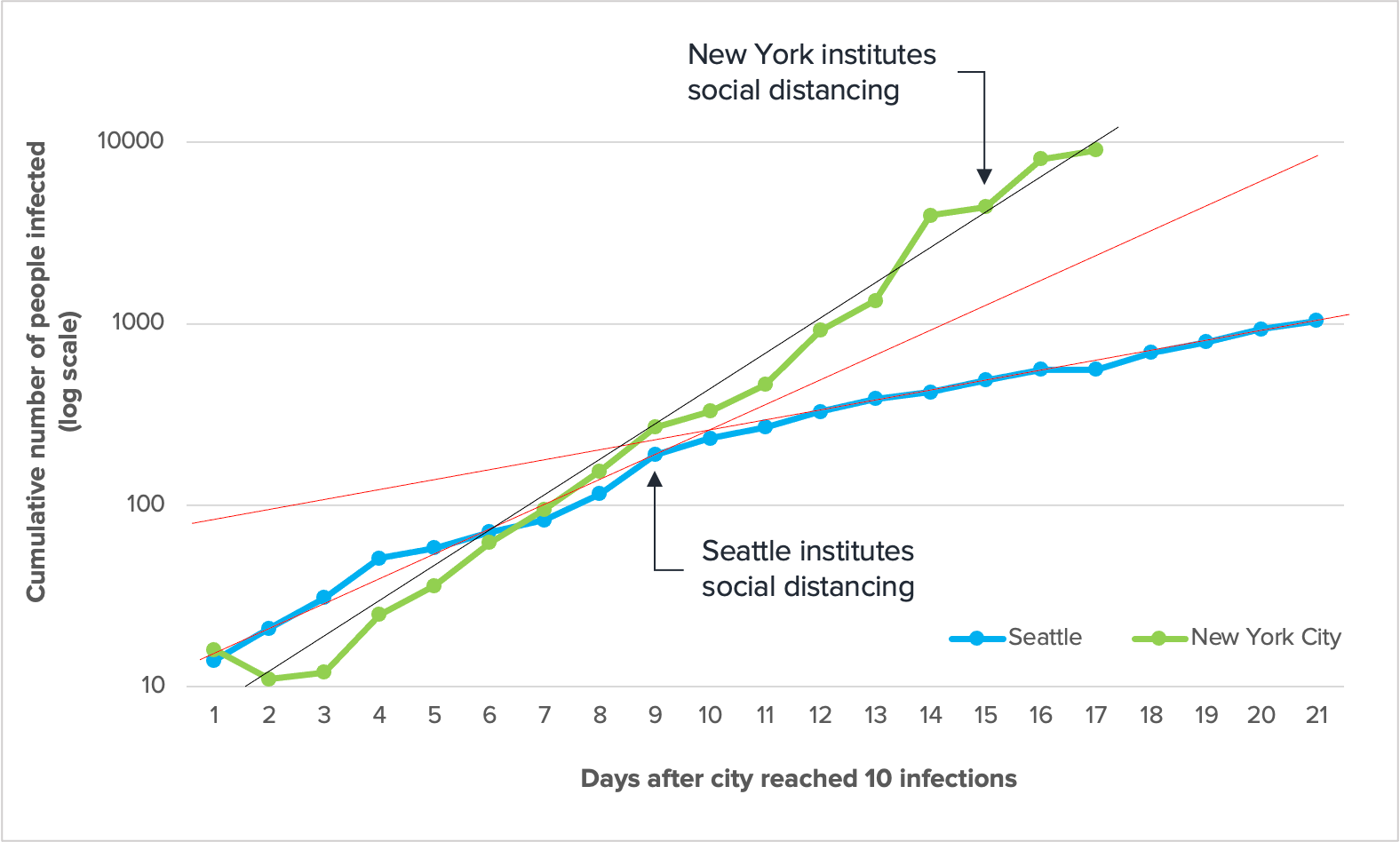Catch up on what’s happening at Keystone and check out insights, deep dives, and industry-defining work from our experts.

.png)

For many finance teams, the annual operating plan remains one of the most resource-intensive and fragile processes of the year. Despite increasing complexity and volatility, planning is still driven by manual forecasts, spreadsheet consolidation, and internal negotiation—leaving leaders with plans that are difficult to defend when conditions change. In this article, originally published in CIO.com, Aarif Nakhooda explores how AI is reshaping the AOP process. Rather than treating planning as a one-time budgeting exercise, the piece describes a shift toward dynamic, explainable forecasts built around core economic drivers. The article outlines how finance leaders are using AI to move beyond guesswork and reconciliation—toward operating plans that adapt as markets, investments, and priorities evolve. Download the article to explore: Why traditional AOP processes break down at scale How AI reframes planning around business drivers, not negotiations What dynamic forecasting changes for CFOs and finance teams How AI enables more confident planning under uncertainty

Seattle, WA — June 2, 2025 — Keystone.ai, a technology and services firm specializing in enterprise AI, economics, and technology advisory, today announced the appointment of Brad Miller as President of CoreAI. Based in Seattle, Miller will lead the company’s CoreAI business and its Deep Enterprise™ AI platform. He joins Keystone from Moderna, where he served as Chief Information Officer and spearheaded one of the biopharma industry’s most advanced AI transformations. Miller brings over three decades of experience transforming technical complexity into strategic advantage. At Moderna, he was a pioneer in enterprise AI, leading one of the industry’s earliest and most successful deployments of ChatGPT through the creation of mChat—a secure, award-winning GenAI platform. Under his leadership, Moderna embraced AI at scale, with thousands of specialized GPTs created across all enterprise business units and functions, fundamentally changing how the company operates. He also drove the commercial technology strategy, resulting in Moderna becoming Keystone’s CoreAI inaugural customer, co-developing and launching an AI-powered forecasting demand model and intelligent control tower. This initiative dramatically enhanced demand visibility, optimized last-mile distribution, and delivered measurable improvements in operational efficiency and cost performance. “Brad isn’t just joining Keystone—he’s returning as one of our most forward-leaning partners,” said Greg Richards, CEO and co-founder of Keystone. “Like much of our team, he started his career building tech for scale at Amazon and Microsoft. He has also led real transformation inside complex, global heterogenous environments. He knows exactly what it takes to help enterprises execute with AI. I am thrilled to welcome him to the team.” Before Moderna, Miller spent over a decade modernizing legacy enterprise systems into cloud- and AI-ready platforms. He held leadership roles including Chief Information Officer of Enterprise Products and Platforms at Capital One, Executive Vice President of Operations and Technology at Mastercard, and Head of Global Digital and Cloud Technology at Citibank. He also spent 17 years in engineering and development roles at Amazon and Microsoft. “Keystone has brought together one of the most extraordinary teams I’ve encountered—a team of visionary AI scientists, economists, machine learning engineers, operators and change managers who have built some of the most advanced forecasting and supply chain AI systems in the world,” said Miller. “The opportunity ahead is one where decisions are driven by science, grounded in data, and accelerated by intelligence. My mission is to embed AI as the scientific engine behind every critical decision our customers make—bringing clarity to complexity, precision to planning, and measurable impact to every corner of the business.” To learn more about Keystone and its services, visit www.keystone.ai. About Keystone.ai Keystone.ai is a global technology and services firm specializing in enterprise AI, economics advisory and technology strategy. Keystone’s Deep Enterprise™ AI platform—built by AI/ML industry pioneers—helps large enterprises optimize business decisions at scale. By combining advanced technology, strategic consulting, and applied econometrics, Keystone delivers innovative solutions to organizations across the technology, business, legal, and government sectors. Founded in 2003, Keystone operates globally with offices in New York, San Francisco, Boston, Seattle, London, and Dubai. For more information, visit www.keystone.ai.

Demand forecasting is the cornerstone of efficient supply chain management, enabling businesses to optimize inventory, production, and distribution. However, traditional forecasting methods often struggle to keep up with the complexities of today's dynamic markets. Factors like moving holidays, slow-moving SKUs, and the need to incorporate various signals like inventory levels and external demand data create significant forecasting challenges.A new generation of forecasting solutions powered by pre-trained AI models is emerging to tackle these challenges head-on. These models are revolutionizing demand forecasting by:Learning From Across Data Points: Unlike traditional methods that often focus on individual time series, pre-trained AI models can learn from vast datasets encompassing diverse products, regions, and time periods. This cross-learning allows them to identify subtle patterns and relationships that would be missed by conventional approaches. Imagine an AI model that recognizes how a promotion in one region impacts sales of a similar product in another, leading to more accurate and insightful forecasts.Refining Pre-Trained Models on Your Own Datasets: While pre-trained AI models come with a wealth of knowledge, they can be further refined using your own historical data. This fine-tuning process allows the model to adapt to the unique nuances of your business, products, and market, resulting in even greater accuracy and relevance.Here's how these advancements address specific forecasting challenges:Moving Holidays: Traditional methods often struggle to account for the variable timing of holidays like Easter or Chinese New Year. AI models can learn these patterns from global data, ensuring accurate forecasts even with shifting holiday dates.Slow-Moving SKUs: Products with intermittent demand patterns can be difficult to forecast. AI models can identify subtle signals and trends across similar products, improving forecast accuracy for these challenging items.Signal Incorporation: AI models can seamlessly integrate a wide range of signals, going beyond just basic demand data. This includes any time-varying variables such as price fluctuations, promotions, inventory levels, macroeconomic indicators, and market trends to capture a more complete picture of demand drivers.Benefits of Pre-Trained AI ModelsImproved Accuracy: AI models can significantly improve forecast accuracy compared to traditional methods, leading to better inventory management, reduced costs, and increased customer satisfaction.Increased Efficiency: Automated AI-powered solutions can streamline the forecasting process, freeing up valuable time for planners to focus on strategic initiatives.Enhanced Agility: AI models can quickly adapt to changing market conditions, enabling businesses to respond more effectively to disruptions and opportunities.A Call to SkepticsThe potential of pre-trained AI models in demand forecasting is undeniable. However, I understand that you may have questions or concerns. I encourage those who are skeptical to share their thoughts and challenges in the comments below. Let's engage in a constructive discussion about how AI can transform demand forecasting and drive better business outcomes.Start the conversation and learn more about Keystone’s CoreAI Solutions by reaching out to us at info@keystone.ai.

Generating Success with Generative AI: How Businesses Are Leveraging LLMs in Operations As Generative AI (GenAI) moves from theoretical promise to practical deployment, Keystone set out to understand how organizations across various sizes and digital maturity levels are introducing and using GenAI to meet their goals. Based on a comprehensive survey of 238 organizations fielded in April 2024, our team noticed distinct patterns, including: • Stratification in the market and in GenAI strategies based on company size • Digital transformation maturity levels significantly impact how effective companies are at leveraging and measuring value from GenAI tools • Only 10% of organizations experienced issue-free GenAI deployments, highlighting the importance of thoughtful governance • And more DOWNLOAD THE REPORT Inside This Report Get detailed insights and data on: • Implementation patterns across company sizes and maturity levels • Industry-specific adoption trends and use cases • Common challenges and success factors in GenAI deployment • Practical frameworks for assessing and implementing GenAI initiatives DOWNLOAD THE REPORT

New York, NY (September 18, 2024) – Keystone, the leading strategy, economics and technology consultancy providing AI-driven services to large companies, government agencies and law firms, today announced the appointment of Dr. Susan Athey as Chief Scientific Advisor. Drawing from an illustrious and multidimensional career in academia, Big Tech and government, Athey will contribute economic and econometric counsel to the firm’s CoreAI division, which offers operational and commercial AI services, algorithms and systems to large enterprises, and advise its Global Economic and Technology Advisory (ETA) group, which provides economic analysis and expert testimony in legal disputes and regulatory matters. Her appointment marks the fourth senior executive hire to the CoreAI team in the past 12 months and underscores the firm’s continued expansion of its team of world-class data scientists, economists and engineers.“Dr. Athey is one of the most widely respected economists in the United States, and her skills and leadership are unique in that they have always been multidisciplinary. For over 20 years, she’s been the leading voice on the value of combining technical expertise with rigorous economic analysis and business insight – a philosophy we share, as our firm was designed around these practices from the start,” said Jeff Marowits, President of Client Services at Keystone. “We are thrilled to welcome Dr. Athey back to the firm in this new role and look forward to continuing our work together to solve the most complex operational and regulatory AI challenges facing organizations today.”As Chief Scientific Advisor, Dr. Athey will provide strategic guidance on CoreAI’s solutions. She joins a distinguished team that includes Patrick Bajari, CoreAI’s Chief Economist and former Chief Economist of Amazon, and Devesh Mishra, President of CoreAI and former Vice President of Global Supply Chain at Amazon. CoreAI offers a powerful combination of pre-trained foundation models, customized algorithms and personalized services.“CoreAI works with clients to build, operate and transfer customized AI/ML solutions solving specific operational challenges and automating deep decision-making for functions including supply chain optimization, forecasting, attribution and more,” said Mishra. “Susan’s expertise in AI/ML, economics and business will be invaluable in delivering transformative solutions to our clients.”Reflecting on her decision to rejoin the firm, Dr. Athey said, “Keystone is the only consultancy with the distinct combination of expertise in economics, technology and strategy that mirrors my own training and work. I’ve been a longtime admirer of the firm Marco Iansiti and Greg Richards founded and am pleased to return as an advisor to help companies navigate this next wave of machine learning and show academics that they can play an important role in solving these new causal problems we’re facing.”Dr. Athey has had a stellar academic career over the last three decades. She is currently the Economics of Technology Professor at the Stanford University Graduate School of Business, where she was a founding associate director of the Stanford Institute for Human-Centered Artificial Intelligence and currently serves as the founding faculty director of the Golub Capital Social Impact Lab at Stanford GSB. She previously served on the faculty of the economics departments at Harvard, MIT and Stanford. Dr. Athey is an elected member of the National Academy of Sciences and is the recipient of the John Bates Clark Medal, awarded by the American Economic Association to the economist under 40 who has made the greatest contributions to economic thought and knowledge. She was also the 2023 President of the American Economic Association.Outside of her academic career, Dr. Athey is celebrated as one of the first “tech economists.” She served as the Chief Economist of Microsoft for six years, where she worked on operation and strategy for the Bing search engine as well as the strategy that took the company into cloud computing with the launch of its Azure platform. She also helped create and grow a team of researchers working at the intersection of social science and machine learning. Subsequently, she served on the boards of directors of multiple technology firms, including Expedia, Lending Club, Rover, Turo and Ripple.Most recently, she served as Chief Economist of the Antitrust Division at the Department of Justice, completing her two-year term as of June 30, 2024. Dr. Athey played a leading role in drafting the 2023 Merger Guidelines which addressed new topics such as platform competition, and led the DOJ to build a new internal team of data scientists and technologists.“Dr. Athey is the premier thought leader in AI- and ML-enabled econometric modeling, and few, if any, other experts have the unique combination of government and business experience she has,” said Jennifer Redmond, Keystone Partner and co-head of the firm’s Antitrust & Competition practice. “The emergence of ChatGPT has unleashed a series of regulatory questions and concerns from both regulators and business leaders amid increasing competition enforcement. Dr. Athey will be an important thought partner on critical regulatory and legal matters for our clients and will strengthen our capacity to deliver unrivaled econometric techniques to improve businesses’ operating models.”###About Keystone StrategyKeystone Strategy, LLC (“Keystone”) is a leading innovative strategy, economic, and technology consulting firm dedicated to delivering transformative ideas and cutting-edge solutions to Fortune Global 500 companies, top law firms, and government agencies. Keystone combines experience in digital transformation, data platform design, analytics, AI and information risk to deliver bold strategies with far-reaching implications for business, consumers, and public policy. It also possesses unique expertise in litigation, M&A, and regulatory policy in matters involving competition, consumer protection, IP, tax and transfer pricing, securities and finance, data privacy, and healthcare. Keystone boasts a roster of hundreds of top academic experts in the digital economy and innovation sectors, supported by more than 175 professionals. The firm has offices in New York, San Francisco, Boston, Seattle, and London. Learn more about Keystone at www.keystone.ai. Media ContactRob ChedidHead of Marketing and Communicationsrchedid@keystone.ai


On Monday March 9, in an effort to address soaring patient demand in Boston, Partners HealthCare went live with a hotline for patients, clinicians, and anyone else with questions and concerns about Covid-19. The goals are to identify and reassure the people who do not need additional care (the vast majority of callers), to direct people with less serious symptoms to relevant information and virtual care options, and to direct the smaller number of high-risk and higher-acuity patients to the most appropriate resources, including testing sites, newly created respiratory illness clinics, or in certain cases, emergency departments. As the hotline became overwhelmed, the average wait time peaked at 30 minutes. Many callers gave up before they could speak with the expert team of nurses staffing the hotline. We were missing opportunities to facilitate pre-hospital triage to get the patient to the right care setting at the right time. The Partners team, led by Lee Schwamm, Haipeng (Mark) Zhang, and Adam Landman, began considering technology options to address the growing need for patient self-triage, including interactive voice response systems and chatbots. We connected with Providence St. Joseph Health system in Seattle, which served some of the country's first Covid-19 patients in early March. In collaboration with Microsoft, Providence built an online screening and triage tool that could rapidly differentiate between those who might really be sick with Covid-19 and those who appear to be suffering from less threatening ailments. In its first week, Providence's tool served more than 40,000 patients, delivering care at an unprecedented scale. Keystone Strategy's Colleen Carroll and Marco Iansiti outline why our national health system cannot keep up with this kind of explosive demand of the coronavirus without the rapid and large-scale adoption of digital operating models. Below is a summary from the article published in Harvard Business Review on April 3, 2020.Summary. The spread of Covid-19 is stretching operational systems in health care and beyond. The reason is both simple: Our economy and health care systems are geared to handle linear, incremental demand, while the virus grows at an exponential rate. Our national health system cannot keep up with this kind of explosive demand without the rapid and large-scale adoption of digital operating models.While we race to dampen the virus's spread, we can optimize our response mechanisms, digitizing as many steps as possible. Here's how some hospitals are employing artificial intelligence to handle the surge of patients.Read the entire article on HRB.com here.

Insufficient data has complicated the rollout of Coronavirus (COVID-19) “Non-Pharmaceutical Interventions” (NPIs) such as the closing of schools. Keystone has partnered with Susan Athey, Stanford Professor of Economics, and Marco Iansiti, Director of Harvard Business School's Digital Initiative, to estimate the effectiveness of NPIs as a guide to policymakers, and to aid firms in developing strategic responses, respectively. We are building a comprehensive, highly localized and freely available data set of city, county and state rollout dates for NPIs. For more information or data access, contact us. NPIs INCLUDE: SDO - Social Distancing of vulnerable persons; SD - Social Distancing of the general population; GS_XX - Gathering Size limitations; CPV - Closure of Public Venues; PC - Closure of schools and universities; NESC - Non-Essential Services Closure; LD - Lock Down (pending); 650 US Counties Covered as of 6/18/2020 (additions in progress). A sample of counties below (additions in progress). To see the full list click here. A sample of counties below: Alameda County, CA Bergen County, NJ Bexar County, TX Contra Costa County, CA Cook County, IL Dallas County, TX Denver County, CO Dupage County, IL Fulton County, GA Hudson County, NJ Johnson County, KS King County, WA Lake County, IL Las Vegas County, NV Los Angeles County, CA Miami Dade County, FL Middlesex County, Ma Nassau County, NY New York City, NY Norfolk County, MA Rockland County, NY San Diego County, CA San Francisco County, CA San Mateo County, CA Santa Clara County, CA Snohomish County, WA Suffolk County, MA Washington, DC Wayne, County, MI Westchester County, NY Please see link to this Shared Google Doc for more information. If you or any of your colleagues would like to expand our dataset to include other countries and/or U.S. cities and counties not yet included, please point them to our links below. With your help sharing these links on social media and via your own networks, we can improve the data set and broaden our initial scope. Request Data: [hubspotform portal_id="6724850" form_id="3655434e-36ed-4659-b7bc-5d7060dfea46" css=""] PUBLISHED PAPERS USING THE KEYSTONE DATASETS FOR NPIs As of November 2, 2021, there have been 19 academic articles published leveraging this dataset. You can find the entire list on Google Scholar here with select articles highlighted below. Scenario analysis of non-pharmaceutical interventions on global COVID-19 transmissions Arvix This paper introduces a dynamic panel SIR (DP-SIR) model to investigate the impact of non-pharmaceutical interventions (NPIs) on the COVID-19 transmission dynamics with panel data from 9 countries across the globe. What works against the spread of COVID-19? Medium With more detailed data on the varying introduction of policies across US counties and over time as well as the resulting spread of the disease we could provide evidence on which measures we should keep and which measures we should lift in order to reactivate the economy. Income Effect and the Private Contribution of Public Goods:Household Mobility and the Economic Impact Payment during the COVID-19 Pandemic Binghamton University This paper studies the public good nature of COVID-19 mitigation effort, and illustrates the relationship between income level and the voluntary contribution to the COVID-19 mitigation effort. Weather, Social Distancing, and the Spread of COVID-19 MedRxiv Using high-frequency panel data for U.S. counties, this paper examines the full dynamic response of COVID-19 cases and deaths to exogenous movements in mobility and weather. Policy Implications of Models of the Spread of Coronavirus: Perspectives and Opportunities for Economists CESifo Working Papers A critical review of models of the spread of the coronavirus (SARS-CoV-2) that have been influential in recent policy discussions. It notes potentially important features of the real- world environment that standard models do not incorporate. The COVID-19 Shock and Consumer Credit: Evidence from Credit Card Data US Federal Reserve Using monthly credit card data from the Federal Reserve's Y-14M reports to study the early impact of the COVID-19 shock on the use and availability of consumer credit. Staggered Adoption of Nonpharmaceutical Interventions to Contain COVID-19 Across U.S. Counties: Direct and Spillover Effects Johns Hopkins Carey Business School We estimate direct and spillover effects of social distancing measures intended to slow the spread of COVID-19 at the U.S. county level using mobility indicators based on cellphone data. We find that spillover effects range between a third and a half of the direct effect depending on the particular outcome or policy considered. Our results suggest that decentralized NPI decisions, which does not internalize externalities generated on surrounding locations, could result in lower NPI implementation and weaker reduction in mobility, and hence more personal contacts and interactions in leisure and work activities, which are the main driver of the COVID-19 transmission. Tracking the Economic Impact of COVID-19 and Mitigation Policies in Europe and the United States International Monetary Fund Here is a framework to use high-frequency indicators, such as electricity usage, for policymakers to assess the economic impact of COVID-19 in close to real time. We also examine the link between economic activity and mitigation efforts to help policymakers better understand the possible path of economic activity as lockdown measures are relaxed.

Below is a summary from the article published in Harvard Business Review in March 26, 2020.Summary. The dramatic speed of the operating-model transformation prompted by the coronavirus is raising truly existential challenges for traditional firms, and for the many employees that depend on them for income. That's because an existing digital transformation effort that's creating competitive advantages for select companies has been thrust into the realm of the workplace itself. Firms that are already far along this transformation will transition smoothly as in-person work is less necessary or even preferable, while many others will struggle. This is creating a new digital divide that will deepen fractures in our society. Can business and government save us from that future? Read the entire article on HRB.com here.

Originally published on February 25, 2020 in Forbes by Sophia Matveeva a Former Forbes Contributor and startup founder in retail tech. Artificial Intelligence is the new fashionable trend in business. While many large corporates create skunkworks for experimental technologies or acquire startups, few incumbent businesses have allowed AI processes to change the core of the organization. This could be because executives in traditional businesses have little understanding of how these technologies work and are unwilling to take the risk of investing in something they do not understand. A recent book by two Harvard Business School professors attempts to deal with this issue. Competing in the Age of AI: strategy and leadership when algorithms and networks run the world presents a compelling case for putting AI at the center of the business. Any business. Authors Marco Iansiti and Karim R. Lakhani show the example of Ant Financial, which serves more than 10 times as many customers as the largest U.S. banks with less than one tenth the number of employees. That extraordinary combination of wide reach and low cost is possible because Ant Financial uses data and artificial intelligence from its core mobile payments platform, Alipay. Read the entire article here.